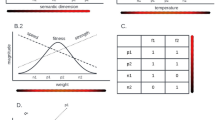Abstract
Our intent in this study was to investigate structural relationships among happiness scales, and to determine whether the happiness construct could be represented adequately by a single score index. Second order principal factors analyses were computed on six data sets representing eight samples of subjects where the variables were comprised of global or sub-global indices of happiness. Single factor solutions were obtained from every analysis. The findings were interpreted as, (1) supporting a hierarchical, rather than an orthogonal multicomponent, model of relationships among happiness scales and, (2) indicating that the construct can be represented adequately by a single score index in social indicators research.
Similar content being viewed by others
Bibliography
Andrews, F. M. and A. C. McKennell: 1980, ‘Measures of self-reported well-being: Their affective, cognitive, and other components’, Social Indicators Research 8, pp. 127–155.
Andrews, F. M. and S. R. Withey: 1976, Social Indicators of Well-Being (Plenum Press, New York).
Beiser, M.: 1974, ‘Components and correlates of mental well-being’, Journal of Health and Social Behavior 15, pp. 320–327.
Bradburn, N. M.: 1969, The Strucure of Psychological Well-Being (Aldine, Chicago).
Carp, F. M. and A. Carp: 1983, ‘Structural stability of well-being factors across age and gender, and development of scales of well-being unbiased for age and gender’, Journal of Gerontology 38, pp. 572–581.
Diener, E.: 1984, ‘Subjective well-being’, Psychological Bulletin 95, pp. 542–575.
Kammann, R., M. Farry and P. Herbison: 1984, ‘The analysis and measurement of happiness as a sense of well-being’, Social Indicators Research 15, pp. 91–116.
Kim, J-O.: 1975, ‘Factor analysis’, in N. H. Nie, C. H. Hull, J. G. Jenkins, K. Steinbrenner and D. H. Brent (eds.), Statistical Package for the Social Sciences, 2nd Edition (McGraw-Hill, New York).
Kozma, A. and M. J. Stones: 1978, ‘Some research issue and findings in the assessment of well-being in the elderly’, Canadian Review of Psychology 19, pp. 241–249.
Kozma, A. and M. J. Stones: 1980, ‘The measurement of happiness: Development of the Memorial University of Newfoundland Scale of Happiness (MUNSH)’, Journal of Gerontology 35, pp. 906–912.
Kozma, A. and M. J. Stones: 1983, ‘Predictors of happiness’, Journal of Gerontology 38, pp. 626–628.
Laing, J.: 1984, ‘Dimensions of the Life Satisfaction Index A: A structural formulation’, Journal of Gerontology 39, pp. 613–623.
Laing, J. and K. A. Bollen: 1983, ‘The structure of the Philadephia Geriatric Center Morale Scale: A reinterpretation’, Journal of Gerontology 38, pp. 181–189.
Lawton, M. P.: 1983, ‘The varieties of well-being’, Experimental Aging Research 9, pp. 65–72.
Lohmann, N.: 1977, ‘Correlations of life satisfaction, moral and adjustment measures’, Journal of Gerontology 33, pp. 73–75.
McKennell, A. C.: 1978, ‘Cognition and affect in perceptions of well-being’, Social Indicators Research 5, pp. 389–426.
McKennell, A. C. and F. M. Andrews: 1980, ‘Models of cognition and affect in perceptions of well-being’, Social Indicators Research 8, pp. 257–298.
Russell, J. A.: 1980, ‘A circumplex model of affect’, Journal of Personality and Social Psychology 6, pp. 1161–1178.
Stones, M. J. and A. Kozma: 1980, ‘Issues relating to the usage and conceptualization of mental health constructs employed by gerontologists’, International Journal of Aging and Human Development 11, pp. 269–282.
Warr, P. B., J. Barter and G. Brownbridge: 1983, ‘On the independence of positive and negative affect’, Journal of Personality and Social Psychology 44, pp. 644–651.
Author information
Authors and Affiliations
Rights and permissions
About this article
Cite this article
Stones, M.J., Kozma, A. Structural relationships among happiness scales: A second order factorial study. Social Indicators Research 17, 19–28 (1985). https://doi.org/10.1007/BF00354110
Received:
Issue Date:
DOI: https://doi.org/10.1007/BF00354110



